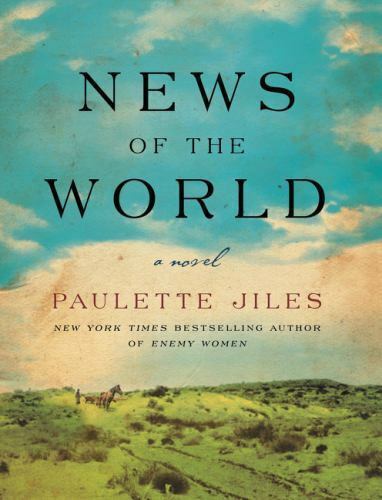
I initially passed on NEWS OF THE WORLD, despite rave reviews, because it sounded too much like TRUE GRIT (older man protecting underage girl in the old west) and because the author had neglected to put quotation marks around her dialog. Now that I do most of my reading from the library, I decided to give it a chance, and I quickly saw that I’d been wrong to hold out.
The voice grabbed me immediately, the sentences, at times intricate, full of not only rhythm but melody and color and specificity and wisdom. From the second sentence I was drawn powerfully to the protagonist, Captain Jefferson Kyle Kidd: “He had been born in 1798 and the third war of his lifetime had ended five years ago and he hoped never to see another but now the news of the world aged him more than time itself.” A good deal of Hemingway there, certainly, but also a good deal of Captain Kidd himself.
The plot is straightforward. For a number of reasons, Kidd agrees to deliver a girl named Johanna from Wichita Falls in the north of Texas to her surviving relatives in Castroville, near San Antonio. Johanna was captured by the Kiowa when she was six and now, four years later, has lost all touch with the European culture she was raised in.
What ensues is a total immersion in 1870s Texas–the landscape and natural history, the bitter political struggles left over from the Civil War, the criminals taking advantage of the near anarchy, the dust and rain and smoke and danger. As we flit occasionally in and out of Johanna’s viewpoint, we also get sensitive and intricate glimpses of Kiowa life.
Jiles’s details are astonishing and utterly convincing, from the mechanics of the excursion wagon Kidd buys for the trip to the geology of the country he passes through, from the firearms to the cookstove, from the clothes to the architecture. She is equally good with the human heart, as in this passage where Kidd explores a burned-out cabin: “Here were memories, loves, deep heartstring notes like the place where he had been raised in Georgia. Here had been people whose dearest memories were the sound of a dipper dropped in the water bucket after taking a drink and the click of it as it hit bottom. The quiet of evening. The shade of a Devil’s trumpet vine over a window, scattered shadows gently hypnotic…”
In a novel where even the horses have individual personalities, the evolving, nearly wordless relationship that develops between Kidd and Johanna is wonderfully complex and is of course the real engine of suspense. Jiles resolves it beautifully, pulling away in the final pages to show the long result, and ending on one of the best closing lines I can remember.
The book is not perfect. There are a couple of villains who lack depth, and the road trip section is a little episodic. And there are those damned missing quotation marks. Why do writers deliberately yank you out of the story and force you to puzzle over who is saying what? (I’m reminded of Hilary Mantel’s WOLF HALL where it was often impossible to tell who the third person pronouns referred to.)
No big deal. The book completely transported me from a particularly unpleasant time in world history. It educated me and touched my heart. And it gladly waded into big issues like love and hate and the meaning of life. What are a few quotation marks in comparison?
